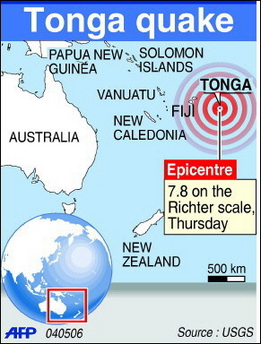A massive earthquake with a magnitude of 7.8 rocked the island nation of
Tonga, triggering a panic evacuation in a New Zealand town after tsunami
warnings were briefly issued for the South Pacific.

Map locating the 7.8
magnitude earthquake which has struck
Tonga[AFP] |
Although the warnings were withdrawn within two hours, hundreds of people in
the New Zealand coastal town of Gisborne, more than 2,200 kilometres (1,375
miles) from the quake's epicentre, fled their homes.
"Most of the coastal communities in Gisborne evacuated," regional civil
defence controller Richard Steele told national radio.
"Things got a bit out of control."
But while there was panic in New Zealand, the 110,000 residents of Tonga were
unaware a tsunami warning had been issued.
"Due to a breakdown in an internal communications' system, the Tonga
authorities received no warning at all. Also, there seemed to be no internal
mechanism for warning," said Kevin Vang of the Australian-Pacific Centre for
Emergency and Disaster Information.
The US Geological Survey (USGS) said a "great" quake, initially measured at
magnitude 8.0, struck at 4:26 am (1526 GMT Wednesday) in the middle of the
islands that make up Tonga.
The epicentre was recorded 160 kilometers (100 miles) northeast of Tonga's
main island of Nuku'Alofa and 16 kilometers below the Earth's surface, a
relatively shallow distance which increases the likelihood of a tsunami.
It was the largest earthquake recorded by the USGS since a 8.6 temblor off
the Indonesian island of Sumatra in March 2005, and immediately sparked fears of
a repeat of the 9.0 Asian tsunami which killed 220,000 people in December 2004.
But despite the ferocity of the quake and aftershocks of magnitude 5.4 and
5.1, there were few reports of injury or damage in Tonga.
One hotel guest, identified as South Korean national Song Sang Hoon, hurt his
leg when he jumped from a third-floor window.
"He was the only tourist injured. He jumped from his room, maybe he was
afraid," said William Vea, the night receptionist at the Pacific Royale Hotel.
Once they assessed the damage was minimal, mainly broken glass and stock
tipped from shop shelves, Tongans went back to bed. But in Gisborne, on New
Zealand's east coast, residents packed what they could in the middle of the
night and headed for higher ground.
Russell Beazley, a worker at a 24-hour petrol station, said it was inundated
with people stocking up before heading out of town.
"It was pretty scary stuff looking at all the locals come in, and they were
all frightened and grabbing all the supplies they could get," he said.
Kelly Cullen said she and her husband drove their children towards the
nearest hill but, hearing it was too crowded, they kept driving. "I'm actually
due to have a baby so we thought we better be organised," she said.
The flight from Gisborne sparked a row over how residents were misled.
Many blamed authorities for not correcting news reports when they knew there
was no tsunami, but Civil Defence Minister Rick Barker blamed the BBC and other
media.
"If the BBC, which is a reliable news outlet... says there is a tsunami
heading to New Zealand, which it wasn't, and said it was aimed at Gisborne,
which it wasn't, and said that there was a police alert, which there was not,
and people accept the value of that news report, then the BBC is at fault," he
said.
New Zealand's Geological and Nuclear Sciences department said the earthquake
was felt in much of the North Island of New Zealand.
Tsunami Warning Center initially called on New Zealand and Fiji to take
immediate action against a possible giant wave, but New Zealand civil defence
officials said it was evident within 30 minutes there would be no significant
tsunami.
In Fiji police advised residents of villages in low-lying areas to move to
higher ground, while tourists in resorts were told to stay on higher floors
where possible.